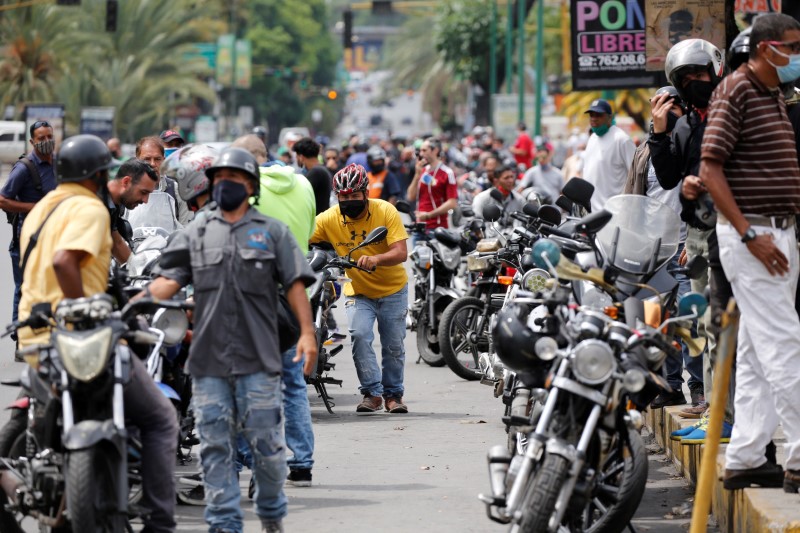By Sarah Kinosian
CARACAS (Reuters) - Venezuela on Monday launched a fuel pricing system that largely rolls back decades of heavy subsidies, creating long lines and leaving drivers confused as the government seeks to end chronic shortages with gasoline imports from Iran.
Cheap fuel was for decades considered a birthright in the South American oil producing nation, but service stations have run dry in recent months due to Venezuela's dysfunctional refineries and U.S. sanctions meant to force President Nicolas Maduro from power.
Defying U.S. threats, Iran sent a flotilla of five tankers of fuel to Venezuela, which arrived last week, and Tehran said on Monday it would send more if requested by Caracas.
Maduro on Sunday created a two-tiered system in which drivers can buy up to 120 liters per month in local currency for the equivalent of $0.02 per liter, but have to pay $0.50 per liter above that amount.
The plan's rollout confused workers and consumers across the country.
By 9 a.m. several stations in Caracas remained closed as staff and security forces meant to oversee the distribution awaited instructions from state-run oil company Petroleos de Venezuela [PDVSA.UL], known as PDVSA.
"We do have gasoline, but it is unclear if we are selling at subsidized (price) or dollarized (price)," said Jefferson Suarez, a military official managing pump lines at a station in eastern Caracas. "PDVSA workers have not shown up yet to explain, and I don't have any idea what is going on."
Outside Caracas, the start was even rockier. In the western border state of Tachira, many stations never opened. In many places, including the western cities of Barquisimeto and Maracaibo, stations quickly ran out of the subsidized gasoline.
PDVSA President Asdrubal Chavez acknowledged there were "still things we need to fix in this process."
"We ask our people for a little bit of patience as we correct these small details," Chavez, named interim PDVSA president last month, told state television.
BOLIVARS OR DOLLARS?
Payment for subsidized fuel, offered in rations of 30 liters per vehicle at most of Venezuela's 1,800 stations, was complicated by malfunctioning payment machines and a dearth of local currency, forcing some stations to charge in dollars - a practice not authorized by authorities.
Many stations required an identification card and bank account to purchase fuel at the subsidized rate, while others required vehicles to be registered in the 'Fatherland System,' a database the government uses to administer welfare benefits.
After an initial 90-day introductory period, motorists wishing to benefit from the subsidy must pay with a 'Fatherland Card' affiliated with the system. Rights groups have raised concerns https://www.reuters.com/investigates/special-report/venezuela-zte the government uses the cards to track citizens' behavior as a means of social control.
Lines snaked around blocks at many stations in Caracas, even at those offering more expensive gasoline in dollars.
"Better to pay them officially at the gas station instead of pay whatever corrupt government officials decide on the black market," said Julio Aponte, 36, a motorcycle delivery driver.
Scarcity has encouraged a black market forcing people to pay at least $2 per liter.
PDVSA did not immediately respond to a request for comment. Chavez said on Monday the new system would help combat "contraband" of fuel.
Others, while thankful gasoline has arrived, are concerned about how they would pay once they pass their quota.

"It's a chain and everything is going to get more expensive," said Julio Arrivillaga, 51, a lawyer. "With subsidies it is OK, but I cannot afford $0.50 a liter on my salary of less than $10 a month."